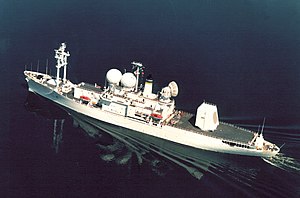USNS Observation Island (T-AGM-23)

USNS Observation Island (T-AGM-23) c.2006.
|
|
| History | |
|---|---|
|
|
|
| Name: | Observation Island |
| Namesake: | An island in the southern section of Lake Okeechobee, Florida |
| Awarded: | 1 June 1951 |
| Builder: | New York Shipbuilding Corporation |
| Yard number: | 494 |
| Laid down: | 15 September 1952 |
| Launched: | 15 August 1953 |
| Sponsored by: | Mrs. Samuel C. Waugh |
| Acquired: | 24 February 1954 |
| Commissioned: | 15 December 1958 |
| Decommissioned: | 1 January 1972 |
| In service: | 1 July 1977 |
| Out of service: | 25 March 2014 |
| Struck: | 31 March 2014 |
| Homeport: | None |
| Identification: |
|
| Status: | Stricken, to be disposed of |
| General characteristics | |
| Class and type: | AMG 53 |
| Displacement: | approx. 17,015 tons (17,288 t) |
| Length: | 564 ft (172 m) |
| Beam: | 76 ft (23 m) |
| Draft: | 28.58333 ft (8.71220 m) |
| Installed power: | Two boilers; 1 GE turbine; 19,250 hp (14.35 MW) |
| Propulsion: | Single screw |
| Speed: | 20 knots (37 km/h) |
| Capacity: |
|
| Complement: |
|
| Sensors and processing systems: |
AN/SPQ-11 Cobra Judy |
| Notes: | MARAD C4-S-1 A |
USNS Observation Island (T-AGM-23) was built as the Mariner-class merchant ship Empire State Mariner for the United States Maritime Commission, launched 15 August 1953, and operated by United States Lines upon delivery on 24 February 1954, making voyages for the Military Sea Transportation Service (MSTS) until going into reserve at Mobile, Alabama on 9 November 1954. Title was transferred to the United States Navy on 10 September 1956 and, after conversion, the ship was renamed Observation Island. On commissioning the ship was classified as the "experimental miscellaneous auxiliary" (EAG), USS Observation Island (EAG-154) supporting fleet ballistic missile development. On 1 April 1968 Observation Island was redesignated as a miscellaneous auxiliary USS Observation Island (AG-154).Observation Island was decommissioned and placed in reserve from 1972 until 1977 in the Suisun Bay Reserve Fleet until withdrawn and then returned in 1978. The ship was permanently withdrawn April 1979 and placed in service with MSTS successor, the Military Sealift Command.
The ship was classified in 1979 as the missile range instrumentation ship USNS Observation Island (T-AGM-23).Observation Island operated worldwide and monitored compliance with strategic arms treaties and supported U.S. military weapons test programs. Observation Island carried the United States Air Force AN/SPQ-11 Cobra Judy passive electronically scanned array radar system for collecting data on missile tests. The ship was operated by Military Sealift Command for the Air Force Technical Applications Center at Patrick Air Force Base.
Observation Island was the platform for the first at-sea firing of the Polaris missile in 1959 and also the platform for first at-sea firing of the Poseidon missile in 1969. In 2014, the ship was one of two Missile Range Instrumentation Ships that had been operated by the Military Sealift Command.
...
Wikipedia
